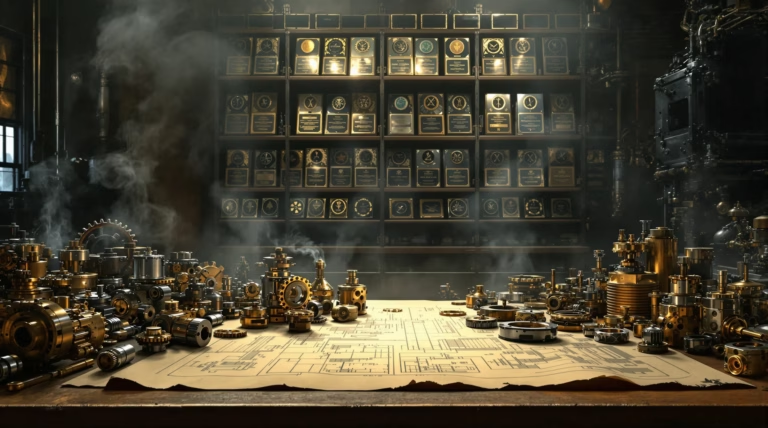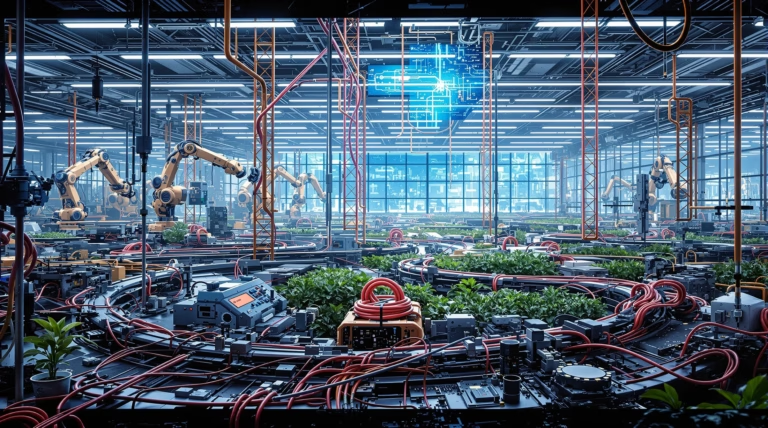Manufacturing Engineer: Roles, Responsibilities, and Career Opportunities
Discover the vital role of manufacturing engineers in modern industry, where innovation meets production efficiency. These professionals shape the future of manufacturing through their expertise in process optimization, quality control, and technological integration.
What is a Manufacturing Engineer?
A manufacturing engineer is a specialized professional who focuses on the design, implementation, maintenance, and improvement of manufacturing processes and systems. These individuals are critical to ensuring efficient production operations across various industries. Manufacturing engineers analyze and optimize manufacturing workflows, implement cost-saving measures, and develop innovative solutions to complex production challenges.
The role bridges the gap between product design and actual production, requiring expertise in both engineering principles and practical manufacturing techniques. Manufacturing engineers apply their knowledge to transform theoretical designs into tangible, mass-producible products while maintaining quality standards and operational efficiency. Their work directly impacts a company’s bottom line by reducing waste, streamlining processes, and enhancing overall productivity.
Definition and Overview
Manufacturing engineers are primarily responsible for implementing, maintaining, troubleshooting, and improving manufacturing processes within production environments. Their core activities include:
- Creating technical drawings and models
- Converting designs into CNC programs
- Developing comprehensive routings for machining processes
- Programming industrial robots for automation
- Implementing lean manufacturing techniques
- Solving production problems through engineering principles
Importance in the Manufacturing Industry
Manufacturing engineers serve as the backbone of modern production facilities, directly influencing operational efficiency, product quality, and innovation capacity. They evaluate existing manufacturing processes by designing and conducting structured research programs to identify areas for improvement.
| Key Contributions | Industry Impact |
|---|---|
| Process Optimization | Enhanced operational efficiency and reduced costs |
| Regulatory Compliance | Maintained industry standards and safety requirements |
| Equipment Management | Improved machinery reliability and performance |
| Industry 4.0 Integration | Advanced automation and smart manufacturing implementation |
Key Responsibilities of a Manufacturing Engineer
Manufacturing engineers shoulder crucial responsibilities that directly impact production efficiency, product quality, and operational excellence. Their expertise encompasses:
- Implementing and improving manufacturing processes
- Managing equipment acquisition and maintenance
- Designing efficient assembly lines
- Controlling specialized manufacturing processes
- Leveraging lean manufacturing tools
- Implementing statistical process control methods
Design and Development of Manufacturing Processes
At the core of manufacturing engineering lies the responsibility for designing and developing efficient production processes. Engineers utilize advanced tools and methodologies, including:
- Computer-aided design (CAD) for process modeling
- Simulation tools for process testing
- Manufacturing routing development
- Tooling and fixture design
- Equipment specification and customization
Quality Control and Assurance
Manufacturing engineers establish comprehensive quality control systems through:
- Designing testing methodologies
- Developing quality assurance protocols
- Implementing measurement systems
- Conducting process validation (IQ, OQ, PQ)
- Statistical process control implementation
- Corrective action procedure development
Collaboration with Cross-Functional Teams
Manufacturing engineers excel at cross-functional collaboration, working seamlessly across diverse organizational teams. They partner with product design engineers to optimize designs for manufacturability, suggesting modifications that enhance production efficiency while maintaining product functionality. Through regular interaction with production supervisors and operators, they gather critical feedback on process performance and implement improvements based on real-world insights.
- Design Engineering – optimizing product designs for manufacturing efficiency
- Production Teams – gathering operational feedback and implementing improvements
- Supply Chain – selecting materials and components that meet quality and cost targets
- Maintenance Teams – developing preventive maintenance schedules
- IT Departments – integrating production systems with enterprise software
Skills Required for a Manufacturing Engineer
Success in manufacturing engineering demands a comprehensive skill set combining technical expertise with analytical capabilities and interpersonal skills. The foundation includes strong engineering principles, manufacturing technologies, and process optimization methodologies. Engineers must analyze complex systems, identify inefficiencies, and implement practical solutions while maintaining product quality. The dynamic nature of manufacturing requires adaptability and commitment to continuous learning as new technologies reshape industry practices.
Technical Skills and Knowledge
- Computer-Aided Design (CAD) and Manufacturing (CAM) software proficiency
- Materials science expertise for optimal material selection
- Quality engineering methodologies (Six Sigma, SPC, DOE)
- Automation technologies (PLCs, robotics, IoT systems)
- Lean manufacturing principles (value stream mapping, 5S, kanban)
- Industry standards and regulatory compliance
Problem-Solving and Analytical Skills
Manufacturing engineers must excel at systematic root cause analysis and data-driven decision-making. They regularly analyze performance metrics, production data, and quality indicators to identify optimization opportunities. This analytical approach combines quantitative reasoning with creative thinking to develop innovative solutions to manufacturing challenges.
| Analytical Capability | Application |
|---|---|
| Root Cause Analysis | Identifying underlying production issues |
| Data Analysis | Evaluating performance metrics and trends |
| Critical Thinking | Assessing solution pathways and risks |
| Decision Making | Balancing theoretical principles with practical constraints |
Communication and Teamwork
- Articulating technical concepts to diverse audiences
- Developing comprehensive documentation and procedures
- Presenting process improvements and investment proposals
- Building cross-functional relationships
- Leading improvement projects and implementation teams
- Providing constructive feedback and conflict resolution
Career Opportunities in Manufacturing Engineering
The manufacturing engineering field presents diverse career paths across multiple industries, including mechanical, electrical, chemical, biopharmaceutical, materials, and industrial engineering. These professionals focus on developing and enhancing manufacturing processes and systems through various improvement projects, from quality initiatives and scrap reduction to safety enhancements and 5S implementation.
Career progression in manufacturing engineering follows a structured path, enabling growth from entry-level positions to specialized roles with increased responsibilities. Entry requirements typically include a Bachelor of Science degree in engineering and proficiency in CAD/CAM software. The continuous evolution of manufacturing technology maintains strong demand for skilled engineers who can optimize production systems across diverse sectors.
Entry-Level Positions
- Manufacturing Engineer-in-Training – assists with process improvements and equipment maintenance
- Junior Manufacturing Engineer – supports quality control initiatives and production systems
- Quality Assurance Specialist – implements and monitors quality systems
- Manufacturing Technician – gains hands-on experience with production equipment
- Process Engineering Associate – learns manufacturing workflows and optimization techniques
Advanced Career Paths
| Career Path | Focus Area |
|---|---|
| Senior Manufacturing Engineer | Process improvement leadership and production system oversight |
| Automation Engineer | Robotic systems and advanced control technologies |
| Manufacturing Engineering Manager | Team leadership and strategic production planning |
| Manufacturing Consultant | Expert guidance on optimization across organizations |
| R&D Engineer | Next-generation manufacturing technologies |
Salary Expectations
- Entry-level hourly rates: $20-$42
- Annual salary range: $42,000-$87,000
- Factors affecting compensation:
- Geographic location (higher in metropolitan areas and tech hubs)
- Industry sector (premium rates in aerospace, medical devices, semiconductors)
- Educational credentials
- Company size
- Technical specializations
Education and Training for Manufacturing Engineers
A strong educational foundation is crucial for manufacturing engineers to develop essential technical and analytical capabilities. Most positions require a Bachelor of Science degree in mechanical engineering, industrial engineering, manufacturing engineering, or related fields. These programs provide fundamental knowledge in engineering principles, materials science, manufacturing processes, and quality control methodologies.
- Core Technical Requirements:
- Proficiency in CAD/CAM software
- Understanding of manufacturing processes
- Knowledge of materials science
- Quality control methodologies
- Emerging technologies expertise (robotics, AI, additive manufacturing)
Educational Requirements
The minimum educational requirement for manufacturing engineers is typically a bachelor’s degree in engineering, with programs focusing on manufacturing, mechanical, or industrial engineering. These undergraduate programs deliver essential coursework in mathematics, physics, materials science, process design, and manufacturing technologies. Programs include hands-on laboratory work and project-based learning experiences that bridge theoretical concepts with practical applications.
- Core Program Components:
- Mathematics and physics fundamentals
- Materials science principles
- Process design methodologies
- Manufacturing technologies
- Laboratory experimentation
- Project-based learning
Advanced positions often require a master’s degree, providing specialized knowledge in automation, lean manufacturing, supply chain optimization, and emerging technologies. ABET-accredited programs are preferred by employers, ensuring graduates meet established industry standards. Practical experience through internships remains valuable for connecting academic knowledge with real-world applications.
Certifications and Continuous Learning
- Professional Certifications:
- Certified Manufacturing Engineer (CMfgE)
- Certified Enterprise Integrator (CEI)
- Six Sigma Green Belt and Black Belt
- Project Management Professional (PMP)
The rapidly evolving manufacturing landscape demands continuous learning through professional development courses, workshops, and industry conferences. Engineers should focus on emerging technologies like Industrial IoT, advanced robotics, and additive manufacturing. Professional associations such as SME and AME provide valuable resources, networking opportunities, and industry insights.
Future Trends in Manufacturing Engineering
Manufacturing engineering is experiencing rapid transformation through Industry 4.0 principles, integrating smart technologies, artificial intelligence, and advanced automation systems. These developments create new opportunities while demanding expanded skill sets in areas like additive manufacturing, robotics, and Industrial Internet of Things (IIoT). The convergence of physical and digital systems through digital twins enables unprecedented process optimization and predictive maintenance capabilities.
Technological Advancements
| Technology Area | Impact on Manufacturing |
|---|---|
| Cloud Computing | Enhanced scalability, remote collaboration, real-time monitoring |
| 3D Printing | Mass customization capabilities, flexible production systems |
| AI-Driven Design | Improved product development, efficient customization |
| Cybersecurity | Protection of connected systems and sensitive data |
These technological evolutions are creating new specialization paths in manufacturing cybersecurity, digital twin implementation, and cloud manufacturing architecture, while reshaping core competencies required for manufacturing engineers.
Sustainability and Green Manufacturing
Sustainability has evolved into a cornerstone of modern manufacturing engineering, with innovative companies integrating sustainable practices across their operations. Manufacturing engineers now develop production systems that balance environmental responsibility with productivity and quality standards. This transformation encompasses multiple aspects of manufacturing operations, driving advancements in resource efficiency and environmental stewardship.
- Key Focus Areas in Sustainable Manufacturing:
- Energy-efficient process optimization
- Waste reduction and management systems
- Circular economy implementation
- Resource-efficient technologies
- Recyclable materials selection
- Energy management integration
| Specialization Area | Career Opportunities |
|---|---|
| Sustainable Materials Engineering | Development of eco-friendly materials and processes |
| Renewable Energy Integration | Design of energy-efficient manufacturing systems |
| Carbon Footprint Reduction | Implementation of emission control strategies |
| Closed-loop Production | Creation of material recovery and reuse systems |
As global environmental regulations become more stringent, manufacturing engineers with expertise in sustainability are increasingly valued. This shift presents opportunities for engineers to drive innovation while advancing their careers in sustainable manufacturing practices, combining environmental stewardship with technological advancement.







